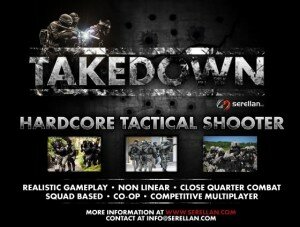
Kickstarter projects have been a big hit recently. Several companies have now seen it as a way to source funding for more ambitious ideas, or for those that have a niche market. So far it seems to be working well, with fans getting their own input on games, while developers work on creating the best product for them.
Serellan LLC has recently been working on their own Kickstarter endeavour, Takedown, which will be a “Realistic Squad-Based Tactical Shooter”.
Kamran Draegar was lucky enough to talk to Christian Allen, the founder of Serellan LLC, who is also known for his previous work on games such as Halo: Reach and Tom Clancy’s Ghost Recon Advanced Warfighter 2.
KD: You said that you began working as a modder for Rainbow 6 after leaving the Marine Corps, did your time in the military influence your approach on video game development? If so, how would you say does that set you apart from other game designers?
CA: I believe it did. While I do not claim to be a combat vet, having actual training and having been in situations where you have had to point a weapon at another human being give you a unique perspective into these kinds of games. Sometimes it is an advantage with the intrinsic knowledge and experience that you have as a former Marine, but sometimes it can have downsides, such as when I was working on GR2 while my friends and comrades were being deployed to Iraq in 2003, and how difficult that was both for myself and my team, as they knew my bags were packed and I was ready to go. It cuts both ways.
KD: Other projects you worked on such as Halo: Reach didn’t necessarily include that realistic edge or “hardcore tactical combat” as you put it. Now that you’re working on such an oldschool project is it going to be completely back to the roots or are you going to try to introduce some innovation inspired from your previous experiences?
CA: Working on games such as Halo: Reach taught me a huge amount as a designer. One of the reasons Halo is successful is the development team’s extensive research and data gathering. Part of that is “accessibility,” i.e., getting players with varying degrees of capabilities into the game as quickly as possible. I think this kind of learning can apply to all games, whether hardcore tactical or not.
Implementing systems that allow gamers to get into gameplay as quickly as they desire by providing quick option selections and clever matchmaking, or supporting gamers that have challenges such as color blindness or deafness (or just want to play on the plane with the audio off), are things that I learned about while working at Bungie that I honestly hadn’t thought of before. I think that taking that modern approach to game development to provide the best experience possible to the most amount of people at once can be combined with an old-school gameplay experience to provide a new, cutting-edge game.
KD: How and when will development begin? And how much is being made from scratch for the games creation?
CA: Game development has begun. We are knee deep in game company startup, dealing with the boring #### such as accountants and location scouting, but also looking at core game technology such as AI.
As far as what is being made from scratch, we are not trying to reinvent the wheel where we don’t have to. We are licensing technology where we can, but are focusing development on the elements that matter to gameplay, like AI and level design.
KD: When the Kickstarter project first launched, you definitely experienced a rough start in comparison to some of the other Adventure campaigns. How did you feel about that? Did you expect it to be more difficult due to the niche market you were targeting?
CA: We had a niche market, and we didn’t step up and provide the information and presentation that people wanted. After a few weeks these elements were clear, and we had a choice, we could slink away and die quietly, or we could step up and show our dedication by redoubling our efforts. I think the outcome shows which path we chose. The game fans and the developers who supported us, both industry and indie, also stepped up to help. Their efforts along with our reboot got us to our goal, and I think our choices, while not the best in the beginning, turned out to be right in the end.
KD: I don’t have any exact numbers in front of me, but I believe the whole thing really began to pick up some speed towards the end, when support started coming from various websites promoting the last push. What was your reaction? Did you still believe that the last 24 hours could be so deciding?
CA: With 24 hours to go, I was typing up our failure email. But then the community, including the fans, industry vets, and indie notables stepped up. The night before the project was scheduled to end; I got a call from an exec buddy at Bungie that gave me advice. A few days before that Ryan Payton called me and gave me advice on how I could relaunch. The day of our end date people like Notch, Brian Fargo, the president of InXile, the former CD from Call of Duty, and others stepped out and lent their names over social media to promote our project. Gamer communities united around the game.
It was crazy, but we went from not going to make it to surpassing our goal in less than twenty four hours. It was a crazy day, and one that I give full credit to the fans of this genre and the industry veterans, indie devs, and others that ballsed up to support this game.
KD: Finally I wanted to ask about the private investors you mentioned. Are you able to shed some light on what caliber of investors we’re talking about? And have they been affected by how the donations came in or are they looking at what the final product will look like in conjunction with the community feedback/ development?
CA: I can’t give specifics on the investors we are talking about; most of them want to keep their identities secret for their own reasons.
I can say the original group of people we were talking with included actors and athletes that were interested in getting involved in video games. The cool news is that because of the interest in the Kickstarter campaign, we have opened doors that were not available to us before, including billionaires interested in the project, and smaller funders that have supported other games that inspired us to go indie. The future is bright!


 April 14th, 2012
April 14th, 2012  Kamran Draeger
Kamran Draeger
 Posted in
Posted in  Tags:
Tags: 